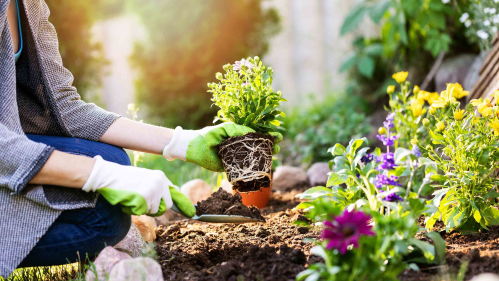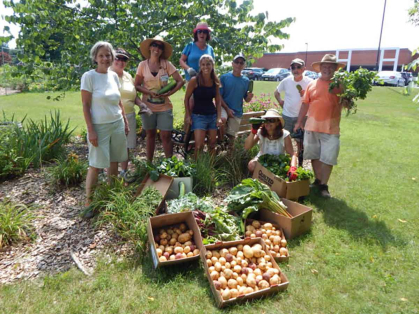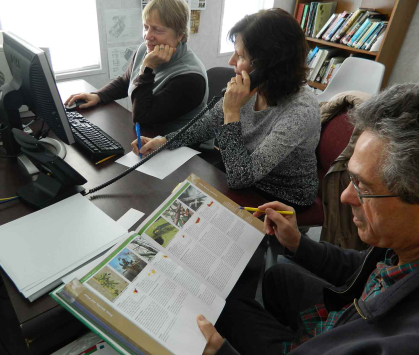If There’s Something Strange Growing in Your Yard, Who You Gonna Call? Master Gardeners

Up-to-date, science-based horticulture advice from Rutgers experts is a phone call away for state residents
Are weeds conquering your victory garden? Have critters turned it into a dine-and-dash buffet?
Sound advice is available for New Jersey residents through the Rutgers Master Gardeners program, which operates helplines throughout the state.

Rutgers master gardeners are trained volunteers who support the Rutgers New Jersey Agricultural Experiment Station Cooperative Extension in its mission to provide horticulture programs and information to the public.
“Every month, we get literally thousands of contacts to the statewide helpline system,” said Ruth Carll, state leader in consumer horticulture who oversees the Rutgers Master Gardener program, which has about 1,200 volunteers and helplines for 16 of the state’s 21 counties.
Carll, who works within the Department of Agriculture and Natural Resources, part of the Rutgers New Jersey Agricultural Experiment Station Cooperative Extension, discussed some common garden concerns, including invasive species and the importance of good soil.
What are people typically asking about right now? What kind of lawn or garden issues are they dealing with?
Lawns, trees and woody plants are the hot topic right now. Cool season lawns have gone dormant and people are either not sure what to do or are concerned about grubs and other infestations.
Trees and woody plants start to show concerning symptoms as we head into hot and dry times. They may drop branches, leaves start looking a little rough and insects and fungus can attack when the plants are stressed.
Another thing that is gearing up: Calls about the Joro spider. When something like this is in the media, people are worried that similar looking spiders that are native may be the Joro spider, so we get a lot of calls about this. And ticks. So many calls and visits with ticks.
What invasive species are people asking about? Are people seeing Joro spiders?
Invasive lawn grasses and other plant questions are common. There is even an invasive orchid that is just starting to bloom and generates “What is this?” calls.
The Joro spider isn’t here yet but, unfortunately for the common garden orb weaver, who is similar looking, there are people calling to see if the Joro is here.

What kind of questions do you wish people would ask to improve their lawns and gardens?
Right plant, right place: I wish people would create a short list of plants that would work in the location they will be planting. It would solve so many problems rather than shopping first and then trying to make a plant that isn’t going to be happy work.
What should people know about soil?
You should get your soil tested. It costs $20 for a test with a detailed report that we will help interpret. You will save so much more by not replacing plants that don’t thrive due to poor soil conditions. Tests can be purchased at each extension office.
And let’s be honest: New Jersey has poor soil conditions. I think people are afraid that the results will mean they have to dig up their entire yard and replace the soil but that is totally wrong. Most times a supplement is all that is needed, and it makes a big difference.
Are there any garden or lawn myths you often must dispel?

Myth: Native plants equal good and non-natives equal bad. There are wonderful non-native plants that don’t become invasive, feed pollinators and play a vital role in the landscape. And, when mixed with native plants, the increased stability is both a money saver and a beauty enhancer. Native plants are a must-have and there are many non-natives that are great additions for year-round landscapes.
What’s your favorite part of your job?
In former roles, it would have been doing the actual teaching, which I really enjoy. However, as the state leader for consumer horticulture, I am able to leverage resources and make connections that zipper the community to current, practical, locally focused research.
I feel like I can make things happen that will help New Jersey, as a community, be happy, healthy, sustainable and beautiful.
How does one become a Rutgers Master Gardener? Are certain credentials required?
Anyone interested in becoming a Rutgers Master Gardener should reach out to the Cooperative Extension Office of their county. The next training opportunity will be in early 2025 as the current trainings are all in progress.
Everyone is welcome. No prior knowledge is required.
– Kitta MacPherson contributed to this article.


